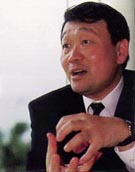The Confucian Businessman
by Douglas C. McGill
(continued from Virtual China home page)
It's precisely Confucius' focus not on the drama of the individual but on the smooth functioning of society that has likely given the belief system its legs -- and tempts Chen with the possiblity of a thoroughly contemporary, business-oriented Confucian code.
|
An Interview with Ming-Jer Chen
 VC: Why is it useful for a Western businessman to know something about
Confucius?
VC: Why is it useful for a Western businessman to know something about
Confucius?
MJC: It will help them to know their joint venture partners, collaborators,
and competitors better. Confucius has fundamentally shaped Asian thinking,
in particular the Chinese, for so long. He's been especially influential
among overseas Chinese. The teachings are also a rich source of wisdom very
useful in a business setting. Confucius teaches the wisdom of a deep
understanding of the other party. You start with introspection and personal
growth and then, most important, put yourself in the shoes of the other.
That's very much the Confucian ideal: you understand yourself, then deeply
understand the other, and then come back and reexamine yourself. Eventually
you will reach the ultimate goodness.
interview continues
|
"When we talk about negotiation in a Western context we use terms like 'conflict resolution,'" Chen says. "Confucius always uses the word 'harmony.' We are talking about different paradigms in operation." Balancing Western and Confucian concepts, Chen says, could lead Western business people to improve their negotiations in a way that not only "resolves conflicts" but sets the stage for further "harmonious," and ultimately profitable, business transactions.
A Stress on 'Harmony'
Combining the "Rule of Man," which Confucius stresses, with the "Rule of Law," stressed in Western business, is another idea that could improve business practices on both sides of the Pacific, Chen says. Confucianism actively dislikes civil law as a means of remedying disputes. Person-to-person and mediated negotiations are vastly preferred.
Critics sometimes cite this as proof of Confucianism's unsuitability to contemporary global business culture, the very foundation of which, it is almost universally agreed, is the Rule of Law. Indeed, the Rule of Man has been held accountable for innumerable miscarriages of justice in recent years in Asia, economic and otherwise. From the "cronyism" that supposedly led to the Asian economic crisis, to the endemic corruption in Chinese business, the Rule of Man at the expense of the Rule of Law has been seen as the ultimate culprit.
Lawyers Go Home
That interpretation perfectly illustrates how Westerners often get only so far and no further in understanding Confucius, Chen said. Taking the Western audience just that bit further is precisely his mission. So wouldn't it be better, he asks with a confident twinkle, if business life in the West was much less litigious? If there was more time spent in the making and selling of wonderful things than arguing at great cost of time and money in courts of law?
That's all Confucius is really saying on this point, Chen says.
"Lawyers should stay home until the very last stage," he said. "The Rule of Man and the Rule of Law are two sides of the same coin. You need that balance. The only question is, which do you start with?"
Monday: Where is China?
Tuesday: The Net: Open Door to the World
Wednesday: Xu Bing: 'Twixt East and West
Thursday: The Confucian Businessman
Friday: Why China Really Matters

